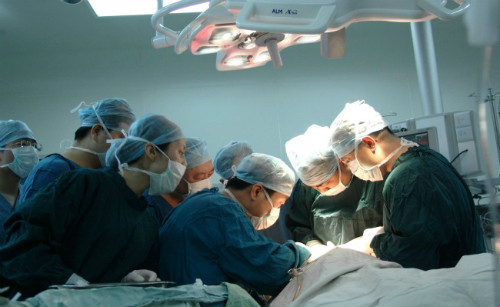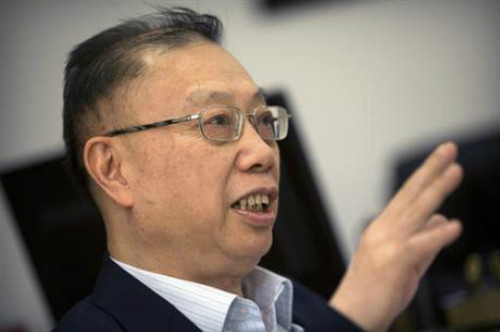Is China still 'harvesting' organs from death row prisoners?
International doctors are divided on whether China has fulfilled its pledge not to harvest organs from executed prisoners.
 |
Doctors perform surgery in China. Photo: Reuters. |
A Canadian patient who received a kidney transplant after waiting just three days on a trip to China has left surgeons in China speechless.The Transplant Society (TTS) is based inMontreal suspects the organ may have come from an executed death row inmate, according to AP.
The case has raised doubts among international doctors about whether China has kept its promise to stop harvesting organs from executed prisoners, a practice condemned by the World Health Organization and others who fear it could encourage executions and involve coercion for organ removal.
China officially announced that it had stopped harvesting organs from executed prisoners in January 2015. Some foreign doctors working in China say the government is behaving more responsibly, but other observers say China has not done enough to demonstrate that it has fulfilled that commitment.
China is trying to use the TTS's annual congress in Hong Kong this month as validation of its change. But Dr. Philip O'Connell, president of the TTS, rejects that interpretation, even though some reforms appear to be working.
“We recognise that this is not going to change overnight,” said Mr O’Connell. “It is not going to be a quick transition from a system that uses organs from executed prisoners, which is fuelled by corruption and money, to a system that is completely open, transparent and ethical.”
Dr. Huang Jiefu, head of China’s hospital transplant monitoring system, is seen as the face of the country’s efforts to change the status quo in organ transplants. Huang publicly admitted in 2005 that Chinese doctors had used organs from executed prisoners. In 2011, Huang and other officials estimated that 65 percent of organs harvested from cadavers came from executed prisoners.
 |
Mr. Hoang Khiet Phu. Photo: AP. |
In an interview last weekend, Mr. Hoang said he believed hospitals under his jurisdiction now used donated organs, but that illegal surgery still existed.
"We still have a long way to go," Mr. Hoang said.
Mr. Huang said he had told government officials about the reforms that would be needed to win the world’s trust. Among the reforms needed were a crackdown on underground organ trafficking and more regulations on organ procurement procedures. China also needed to train more doctors and hospitals to perform the surgeries, he said.
"Our organ transplant work must rely 100% on voluntary organ donations from the people," Mr. Hoang said. "Otherwise, we cannot stand on the world stage."
China is believed to be the world's most prolific executioner, although the number is kept secret. Amnesty International estimates the annual number to be in the thousands.
A pilot organ donation registry launched in 2010 has been expanded into a national system. Chinese newspapers often carry positive stories about families donating the organs of deceased relatives – an apparent attempt to change long-held cultural attitudes about organ donation.
According to the government, Chinese doctors performed 10,057 organ transplants in 2015. Health officials also say they hope to increase the number of hospitals that can perform transplants. By their own estimates, China has about 300,000 patients a year who need transplants. The country's organ donation rate is higher than Japan and most other Asian countries, but still far lower than the United States and most Western European countries.
Chinese government statistics are often met with deep skepticism, and many critics say they do not believe them. Some point to the prevalence of clandestine surgery, the belief that the actual number of transplants is much higher than the official figure, and that executed prisoners remain a major source of organs.
Dr. Torsten Trey, executive director of Doctors Against Forced Organ Harvesting, said outsiders don't have enough visibility into the system to really assess the accuracy of China's statistics or claims of progress.
“Change fails because there is no change,” Mr. Trey wrote in an email.
Signs of change
Over the past decade, doctors from outside China have worked with Mr. Huang and other officials. Mr. Huang said he has invited transplant surgeons to tour hospitals and meet with Chinese doctors.
Michael Millis, a surgeon at the University of Chicago, visited several dozen transplant centers in China while volunteering there. He said one sign of change was that doctors in those centers who previously had regularly scheduled surgeries now said they performed many surgeries some days, but had days or weeks when they did none. That suggests they are operating on the erratic schedule of a system driven by voluntary organ donations, not executions, Mr. Millis said.
“These are stories where I can say, from my own experience, I have seen change,” Mr. Millis said.
Milis says the Canadian patient's case shows that illegal surgery still occurs in China, but not to the extent others have alleged.
"There is no evidence that there is a large black market system that takes large numbers of organs from executed prisoners," Mr Millis said, adding that clandestine organ transplants also occur in other parts of the world.
Mr. Milis and other doctors hope to improve China's system by working with health officials they find receptive and willing to consider reform.
In the case of the Canadian patient, TTS was notified shortly after the patient returned to Canada and told his doctor that he had purchased a kidney and needed post-operative care. TTS sent a letter to Mr. Hoang calling for an investigation shortly before the meeting in Hong Kong.
Mr. Hoang later said that Chinese authorities had revoked the licenses of the surgeon and the hospital that performed the surgery and launched a criminal investigation.
According to Mr. O'Connell, TTS told Chinese officials: "This is damaging to what you are trying to achieve, and you need to act."
“Only the Chinese people can bring about change or reform in their country,” Mr. O’Connell said. “What we are trying to do is identify those who we believe are pro-reform in China and try to encourage them.”
According to VNE
| RELATED NEWS |
|---|

